Examining Reward Management's Role in Employee Retention at all Levels
VerifiedAdded on 2020/06/04
|9
|2685
|59
Report
AI Summary
This report delves into the critical role of reward management in retaining employees at all organizational levels, from trainees to directors. It examines the significance of reward systems in motivating employees, differentiating between intrinsic and extrinsic rewards and their impact on performance. The report explores the application of motivational theories, including Maslow's hierarchy of needs, Herzberg's two-factor theory, and Adams' equity theory, providing insights into how these frameworks can be leveraged to create a healthy and productive work environment. Through analysis and evidence-based discussions, the report emphasizes the importance of fair and effective reward strategies in fostering job satisfaction and commitment, ultimately leading to improved employee retention and organizational success. The report highlights the importance of recognizing employee achievements and ensuring fairness in reward distribution to maintain a motivated workforce. The content is available on Desklib, a platform offering AI-based study tools.

Paraphrase This Document
Need a fresh take? Get an instant paraphrase of this document with our AI Paraphraser
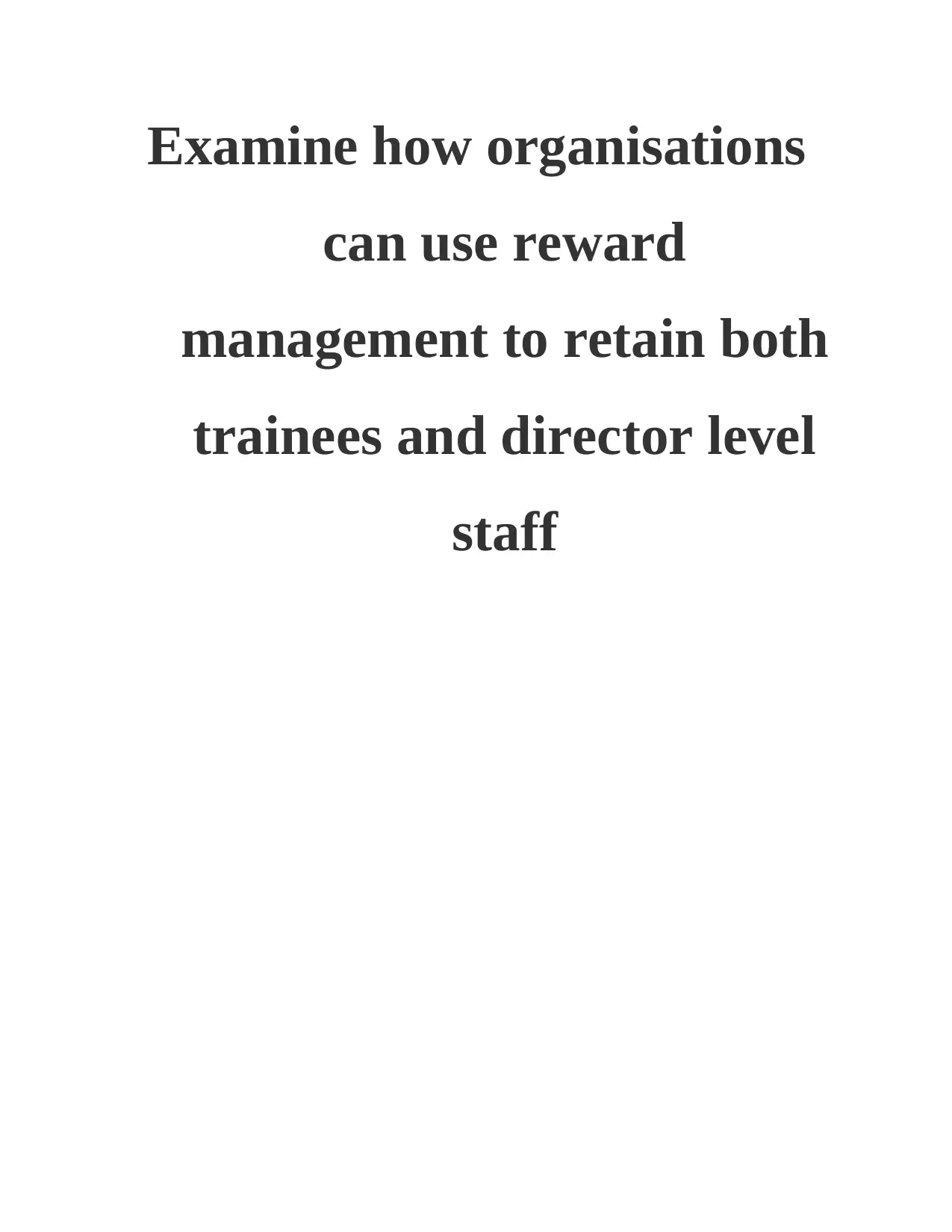
Examine how organisations
can use reward
management to retain both
trainees and director level
staff
can use reward
management to retain both
trainees and director level
staff
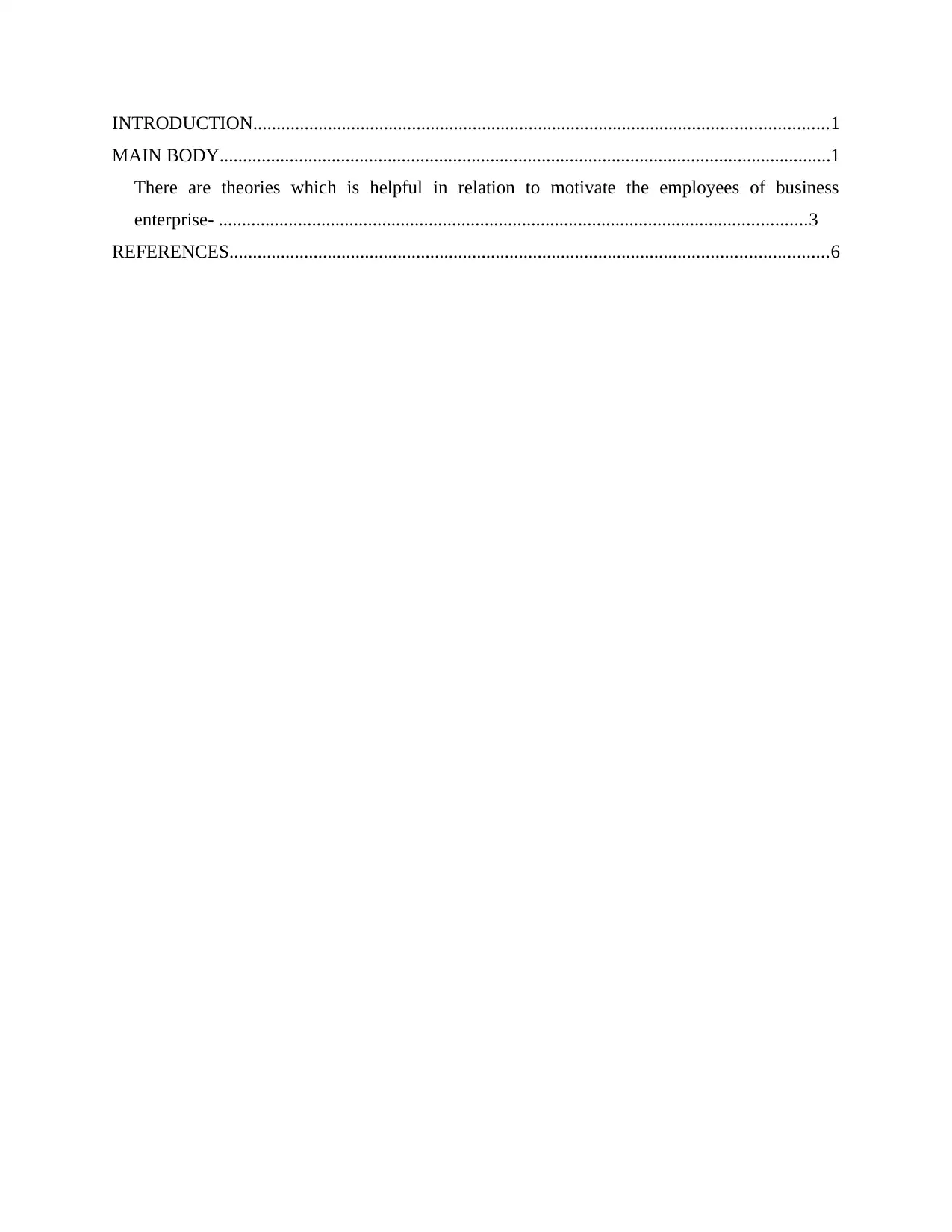
INTRODUCTION...........................................................................................................................1
MAIN BODY...................................................................................................................................1
There are theories which is helpful in relation to motivate the employees of business
enterprise- ..............................................................................................................................3
REFERENCES................................................................................................................................6
MAIN BODY...................................................................................................................................1
There are theories which is helpful in relation to motivate the employees of business
enterprise- ..............................................................................................................................3
REFERENCES................................................................................................................................6
⊘ This is a preview!⊘
Do you want full access?
Subscribe today to unlock all pages.

Trusted by 1+ million students worldwide
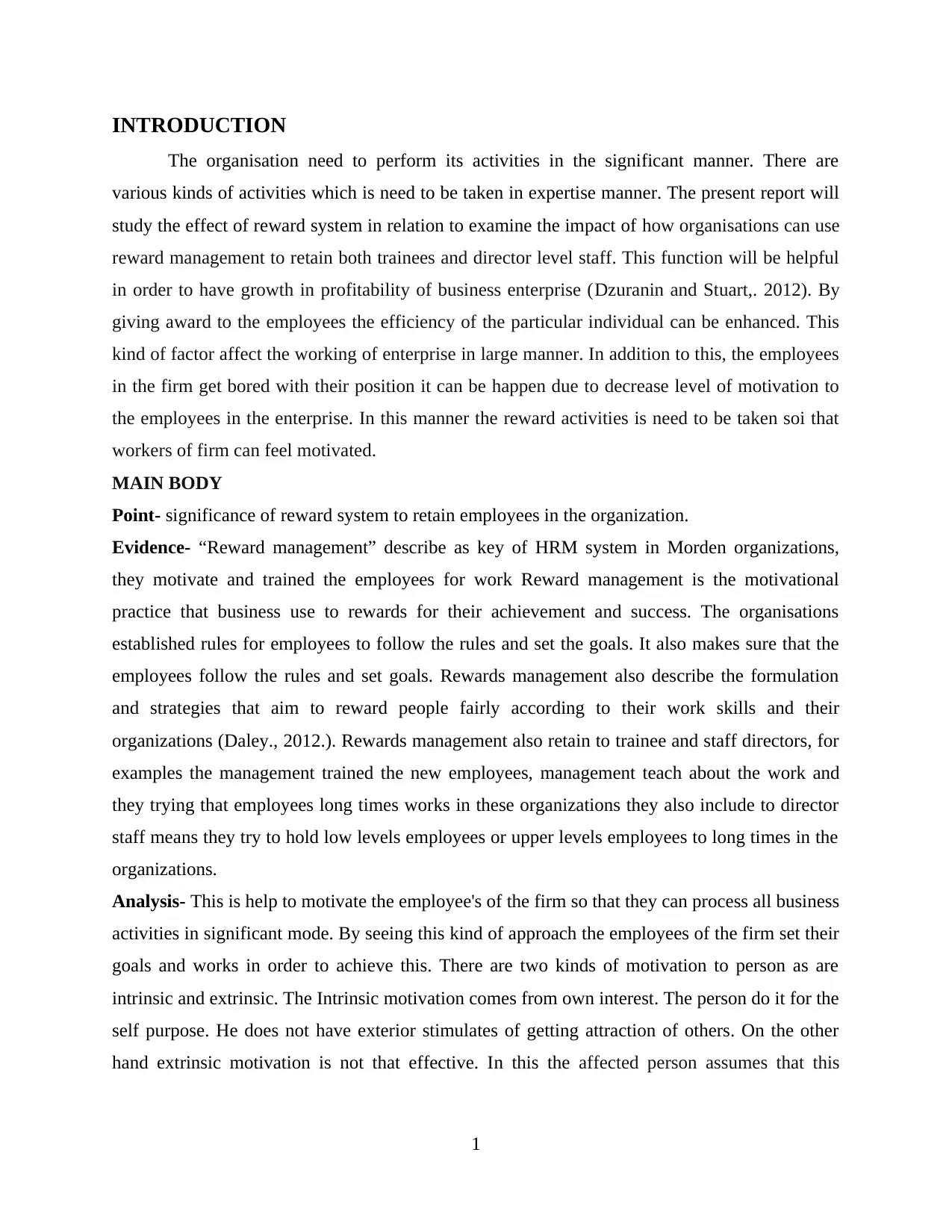
INTRODUCTION
The organisation need to perform its activities in the significant manner. There are
various kinds of activities which is need to be taken in expertise manner. The present report will
study the effect of reward system in relation to examine the impact of how organisations can use
reward management to retain both trainees and director level staff. This function will be helpful
in order to have growth in profitability of business enterprise (Dzuranin and Stuart,. 2012). By
giving award to the employees the efficiency of the particular individual can be enhanced. This
kind of factor affect the working of enterprise in large manner. In addition to this, the employees
in the firm get bored with their position it can be happen due to decrease level of motivation to
the employees in the enterprise. In this manner the reward activities is need to be taken soi that
workers of firm can feel motivated.
MAIN BODY
Point- significance of reward system to retain employees in the organization.
Evidence- “Reward management” describe as key of HRM system in Morden organizations,
they motivate and trained the employees for work Reward management is the motivational
practice that business use to rewards for their achievement and success. The organisations
established rules for employees to follow the rules and set the goals. It also makes sure that the
employees follow the rules and set goals. Rewards management also describe the formulation
and strategies that aim to reward people fairly according to their work skills and their
organizations (Daley., 2012.). Rewards management also retain to trainee and staff directors, for
examples the management trained the new employees, management teach about the work and
they trying that employees long times works in these organizations they also include to director
staff means they try to hold low levels employees or upper levels employees to long times in the
organizations.
Analysis- This is help to motivate the employee's of the firm so that they can process all business
activities in significant mode. By seeing this kind of approach the employees of the firm set their
goals and works in order to achieve this. There are two kinds of motivation to person as are
intrinsic and extrinsic. The Intrinsic motivation comes from own interest. The person do it for the
self purpose. He does not have exterior stimulates of getting attraction of others. On the other
hand extrinsic motivation is not that effective. In this the affected person assumes that this
1
The organisation need to perform its activities in the significant manner. There are
various kinds of activities which is need to be taken in expertise manner. The present report will
study the effect of reward system in relation to examine the impact of how organisations can use
reward management to retain both trainees and director level staff. This function will be helpful
in order to have growth in profitability of business enterprise (Dzuranin and Stuart,. 2012). By
giving award to the employees the efficiency of the particular individual can be enhanced. This
kind of factor affect the working of enterprise in large manner. In addition to this, the employees
in the firm get bored with their position it can be happen due to decrease level of motivation to
the employees in the enterprise. In this manner the reward activities is need to be taken soi that
workers of firm can feel motivated.
MAIN BODY
Point- significance of reward system to retain employees in the organization.
Evidence- “Reward management” describe as key of HRM system in Morden organizations,
they motivate and trained the employees for work Reward management is the motivational
practice that business use to rewards for their achievement and success. The organisations
established rules for employees to follow the rules and set the goals. It also makes sure that the
employees follow the rules and set goals. Rewards management also describe the formulation
and strategies that aim to reward people fairly according to their work skills and their
organizations (Daley., 2012.). Rewards management also retain to trainee and staff directors, for
examples the management trained the new employees, management teach about the work and
they trying that employees long times works in these organizations they also include to director
staff means they try to hold low levels employees or upper levels employees to long times in the
organizations.
Analysis- This is help to motivate the employee's of the firm so that they can process all business
activities in significant mode. By seeing this kind of approach the employees of the firm set their
goals and works in order to achieve this. There are two kinds of motivation to person as are
intrinsic and extrinsic. The Intrinsic motivation comes from own interest. The person do it for the
self purpose. He does not have exterior stimulates of getting attraction of others. On the other
hand extrinsic motivation is not that effective. In this the affected person assumes that this
1
Paraphrase This Document
Need a fresh take? Get an instant paraphrase of this document with our AI Paraphraser
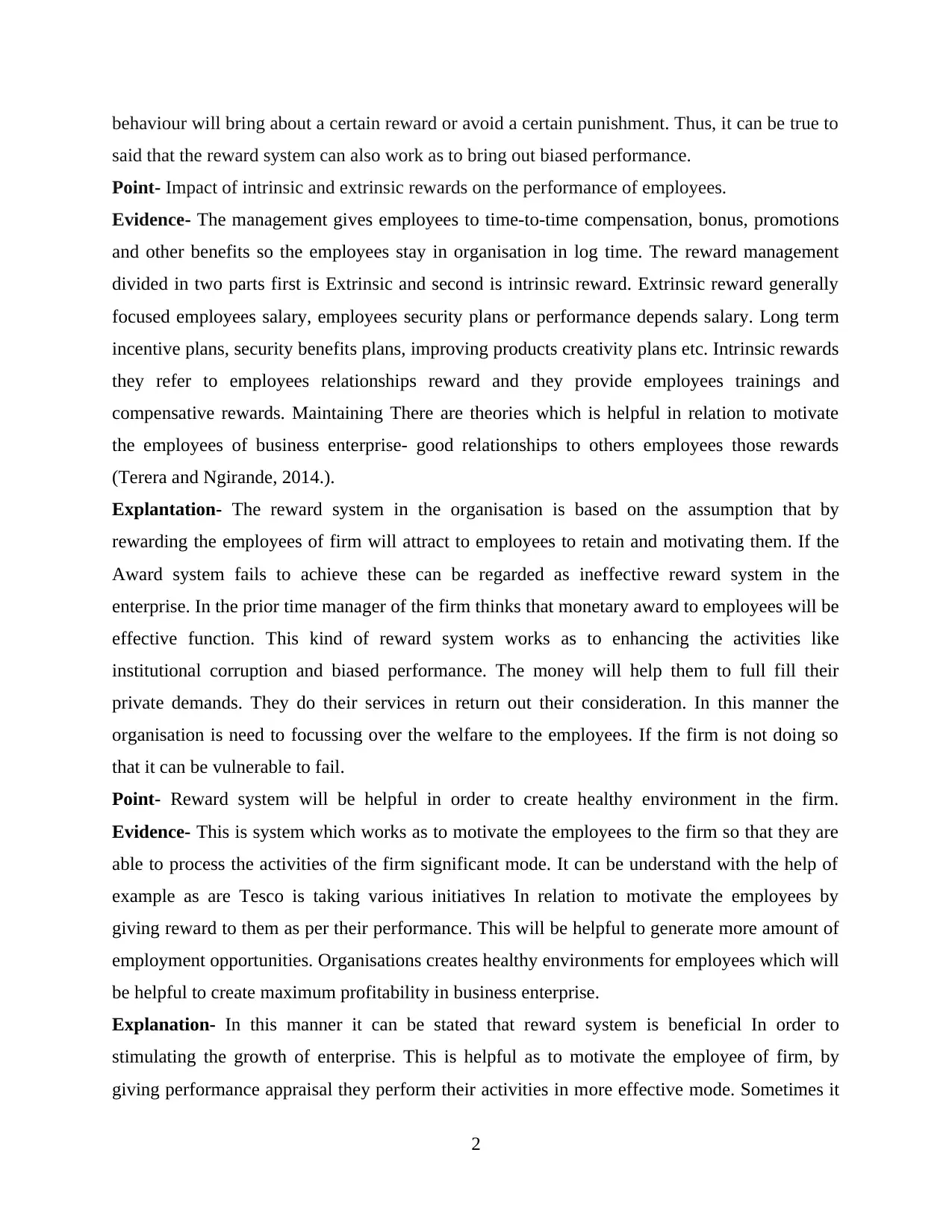
behaviour will bring about a certain reward or avoid a certain punishment. Thus, it can be true to
said that the reward system can also work as to bring out biased performance.
Point- Impact of intrinsic and extrinsic rewards on the performance of employees.
Evidence- The management gives employees to time-to-time compensation, bonus, promotions
and other benefits so the employees stay in organisation in log time. The reward management
divided in two parts first is Extrinsic and second is intrinsic reward. Extrinsic reward generally
focused employees salary, employees security plans or performance depends salary. Long term
incentive plans, security benefits plans, improving products creativity plans etc. Intrinsic rewards
they refer to employees relationships reward and they provide employees trainings and
compensative rewards. Maintaining There are theories which is helpful in relation to motivate
the employees of business enterprise- good relationships to others employees those rewards
(Terera and Ngirande, 2014.).
Explantation- The reward system in the organisation is based on the assumption that by
rewarding the employees of firm will attract to employees to retain and motivating them. If the
Award system fails to achieve these can be regarded as ineffective reward system in the
enterprise. In the prior time manager of the firm thinks that monetary award to employees will be
effective function. This kind of reward system works as to enhancing the activities like
institutional corruption and biased performance. The money will help them to full fill their
private demands. They do their services in return out their consideration. In this manner the
organisation is need to focussing over the welfare to the employees. If the firm is not doing so
that it can be vulnerable to fail.
Point- Reward system will be helpful in order to create healthy environment in the firm.
Evidence- This is system which works as to motivate the employees to the firm so that they are
able to process the activities of the firm significant mode. It can be understand with the help of
example as are Tesco is taking various initiatives In relation to motivate the employees by
giving reward to them as per their performance. This will be helpful to generate more amount of
employment opportunities. Organisations creates healthy environments for employees which will
be helpful to create maximum profitability in business enterprise.
Explanation- In this manner it can be stated that reward system is beneficial In order to
stimulating the growth of enterprise. This is helpful as to motivate the employee of firm, by
giving performance appraisal they perform their activities in more effective mode. Sometimes it
2
said that the reward system can also work as to bring out biased performance.
Point- Impact of intrinsic and extrinsic rewards on the performance of employees.
Evidence- The management gives employees to time-to-time compensation, bonus, promotions
and other benefits so the employees stay in organisation in log time. The reward management
divided in two parts first is Extrinsic and second is intrinsic reward. Extrinsic reward generally
focused employees salary, employees security plans or performance depends salary. Long term
incentive plans, security benefits plans, improving products creativity plans etc. Intrinsic rewards
they refer to employees relationships reward and they provide employees trainings and
compensative rewards. Maintaining There are theories which is helpful in relation to motivate
the employees of business enterprise- good relationships to others employees those rewards
(Terera and Ngirande, 2014.).
Explantation- The reward system in the organisation is based on the assumption that by
rewarding the employees of firm will attract to employees to retain and motivating them. If the
Award system fails to achieve these can be regarded as ineffective reward system in the
enterprise. In the prior time manager of the firm thinks that monetary award to employees will be
effective function. This kind of reward system works as to enhancing the activities like
institutional corruption and biased performance. The money will help them to full fill their
private demands. They do their services in return out their consideration. In this manner the
organisation is need to focussing over the welfare to the employees. If the firm is not doing so
that it can be vulnerable to fail.
Point- Reward system will be helpful in order to create healthy environment in the firm.
Evidence- This is system which works as to motivate the employees to the firm so that they are
able to process the activities of the firm significant mode. It can be understand with the help of
example as are Tesco is taking various initiatives In relation to motivate the employees by
giving reward to them as per their performance. This will be helpful to generate more amount of
employment opportunities. Organisations creates healthy environments for employees which will
be helpful to create maximum profitability in business enterprise.
Explanation- In this manner it can be stated that reward system is beneficial In order to
stimulating the growth of enterprise. This is helpful as to motivate the employee of firm, by
giving performance appraisal they perform their activities in more effective mode. Sometimes it
2
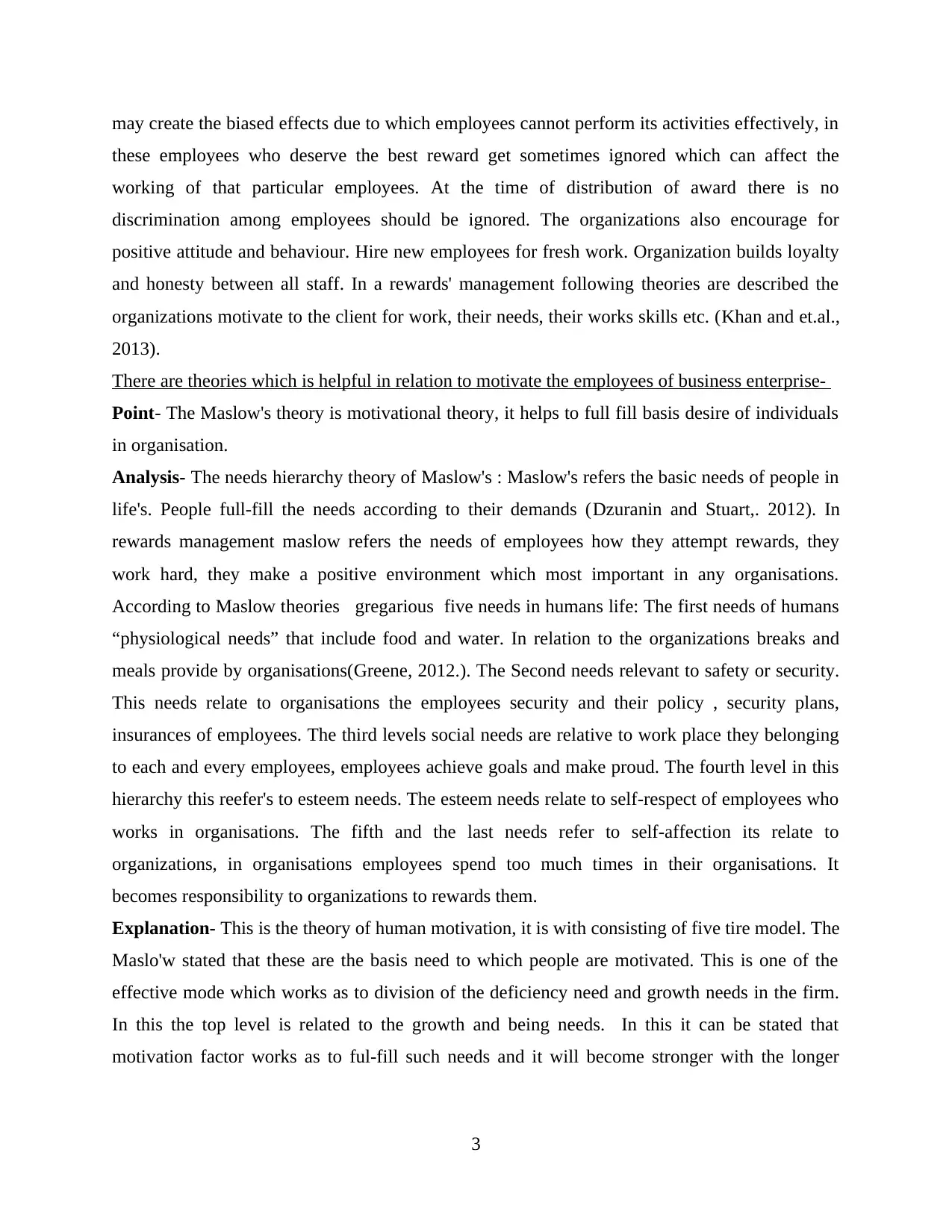
may create the biased effects due to which employees cannot perform its activities effectively, in
these employees who deserve the best reward get sometimes ignored which can affect the
working of that particular employees. At the time of distribution of award there is no
discrimination among employees should be ignored. The organizations also encourage for
positive attitude and behaviour. Hire new employees for fresh work. Organization builds loyalty
and honesty between all staff. In a rewards' management following theories are described the
organizations motivate to the client for work, their needs, their works skills etc. (Khan and et.al.,
2013).
There are theories which is helpful in relation to motivate the employees of business enterprise-
Point- The Maslow's theory is motivational theory, it helps to full fill basis desire of individuals
in organisation.
Analysis- The needs hierarchy theory of Maslow's : Maslow's refers the basic needs of people in
life's. People full-fill the needs according to their demands (Dzuranin and Stuart,. 2012). In
rewards management maslow refers the needs of employees how they attempt rewards, they
work hard, they make a positive environment which most important in any organisations.
According to Maslow theories gregarious five needs in humans life: The first needs of humans
“physiological needs” that include food and water. In relation to the organizations breaks and
meals provide by organisations(Greene, 2012.). The Second needs relevant to safety or security.
This needs relate to organisations the employees security and their policy , security plans,
insurances of employees. The third levels social needs are relative to work place they belonging
to each and every employees, employees achieve goals and make proud. The fourth level in this
hierarchy this reefer's to esteem needs. The esteem needs relate to self-respect of employees who
works in organisations. The fifth and the last needs refer to self-affection its relate to
organizations, in organisations employees spend too much times in their organisations. It
becomes responsibility to organizations to rewards them.
Explanation- This is the theory of human motivation, it is with consisting of five tire model. The
Maslo'w stated that these are the basis need to which people are motivated. This is one of the
effective mode which works as to division of the deficiency need and growth needs in the firm.
In this the top level is related to the growth and being needs. In this it can be stated that
motivation factor works as to ful-fill such needs and it will become stronger with the longer
3
these employees who deserve the best reward get sometimes ignored which can affect the
working of that particular employees. At the time of distribution of award there is no
discrimination among employees should be ignored. The organizations also encourage for
positive attitude and behaviour. Hire new employees for fresh work. Organization builds loyalty
and honesty between all staff. In a rewards' management following theories are described the
organizations motivate to the client for work, their needs, their works skills etc. (Khan and et.al.,
2013).
There are theories which is helpful in relation to motivate the employees of business enterprise-
Point- The Maslow's theory is motivational theory, it helps to full fill basis desire of individuals
in organisation.
Analysis- The needs hierarchy theory of Maslow's : Maslow's refers the basic needs of people in
life's. People full-fill the needs according to their demands (Dzuranin and Stuart,. 2012). In
rewards management maslow refers the needs of employees how they attempt rewards, they
work hard, they make a positive environment which most important in any organisations.
According to Maslow theories gregarious five needs in humans life: The first needs of humans
“physiological needs” that include food and water. In relation to the organizations breaks and
meals provide by organisations(Greene, 2012.). The Second needs relevant to safety or security.
This needs relate to organisations the employees security and their policy , security plans,
insurances of employees. The third levels social needs are relative to work place they belonging
to each and every employees, employees achieve goals and make proud. The fourth level in this
hierarchy this reefer's to esteem needs. The esteem needs relate to self-respect of employees who
works in organisations. The fifth and the last needs refer to self-affection its relate to
organizations, in organisations employees spend too much times in their organisations. It
becomes responsibility to organizations to rewards them.
Explanation- This is the theory of human motivation, it is with consisting of five tire model. The
Maslo'w stated that these are the basis need to which people are motivated. This is one of the
effective mode which works as to division of the deficiency need and growth needs in the firm.
In this the top level is related to the growth and being needs. In this it can be stated that
motivation factor works as to ful-fill such needs and it will become stronger with the longer
3
⊘ This is a preview!⊘
Do you want full access?
Subscribe today to unlock all pages.

Trusted by 1+ million students worldwide
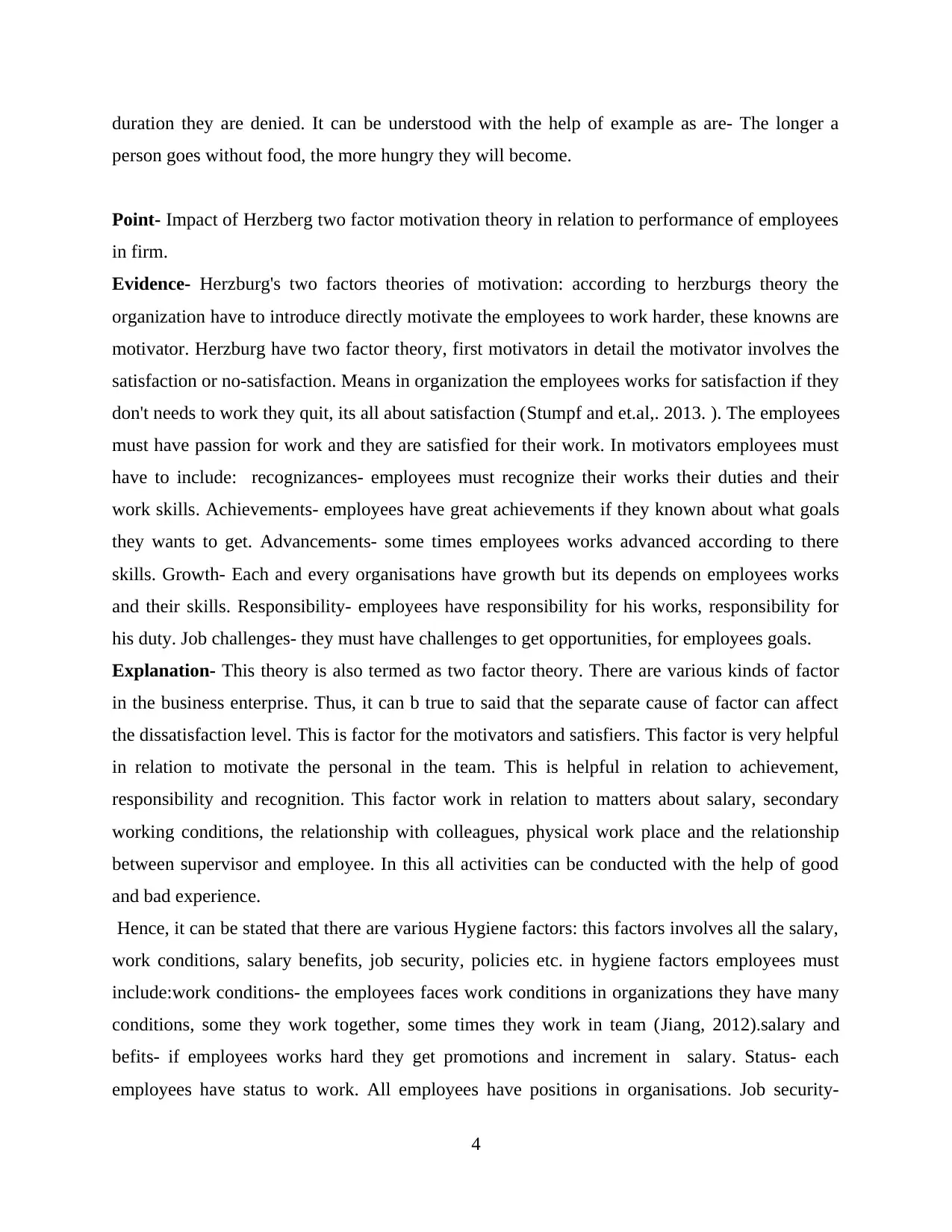
duration they are denied. It can be understood with the help of example as are- The longer a
person goes without food, the more hungry they will become.
Point- Impact of Herzberg two factor motivation theory in relation to performance of employees
in firm.
Evidence- Herzburg's two factors theories of motivation: according to herzburgs theory the
organization have to introduce directly motivate the employees to work harder, these knowns are
motivator. Herzburg have two factor theory, first motivators in detail the motivator involves the
satisfaction or no-satisfaction. Means in organization the employees works for satisfaction if they
don't needs to work they quit, its all about satisfaction (Stumpf and et.al,. 2013. ). The employees
must have passion for work and they are satisfied for their work. In motivators employees must
have to include: recognizances- employees must recognize their works their duties and their
work skills. Achievements- employees have great achievements if they known about what goals
they wants to get. Advancements- some times employees works advanced according to there
skills. Growth- Each and every organisations have growth but its depends on employees works
and their skills. Responsibility- employees have responsibility for his works, responsibility for
his duty. Job challenges- they must have challenges to get opportunities, for employees goals.
Explanation- This theory is also termed as two factor theory. There are various kinds of factor
in the business enterprise. Thus, it can b true to said that the separate cause of factor can affect
the dissatisfaction level. This is factor for the motivators and satisfiers. This factor is very helpful
in relation to motivate the personal in the team. This is helpful in relation to achievement,
responsibility and recognition. This factor work in relation to matters about salary, secondary
working conditions, the relationship with colleagues, physical work place and the relationship
between supervisor and employee. In this all activities can be conducted with the help of good
and bad experience.
Hence, it can be stated that there are various Hygiene factors: this factors involves all the salary,
work conditions, salary benefits, job security, policies etc. in hygiene factors employees must
include:work conditions- the employees faces work conditions in organizations they have many
conditions, some they work together, some times they work in team (Jiang, 2012).salary and
befits- if employees works hard they get promotions and increment in salary. Status- each
employees have status to work. All employees have positions in organisations. Job security-
4
person goes without food, the more hungry they will become.
Point- Impact of Herzberg two factor motivation theory in relation to performance of employees
in firm.
Evidence- Herzburg's two factors theories of motivation: according to herzburgs theory the
organization have to introduce directly motivate the employees to work harder, these knowns are
motivator. Herzburg have two factor theory, first motivators in detail the motivator involves the
satisfaction or no-satisfaction. Means in organization the employees works for satisfaction if they
don't needs to work they quit, its all about satisfaction (Stumpf and et.al,. 2013. ). The employees
must have passion for work and they are satisfied for their work. In motivators employees must
have to include: recognizances- employees must recognize their works their duties and their
work skills. Achievements- employees have great achievements if they known about what goals
they wants to get. Advancements- some times employees works advanced according to there
skills. Growth- Each and every organisations have growth but its depends on employees works
and their skills. Responsibility- employees have responsibility for his works, responsibility for
his duty. Job challenges- they must have challenges to get opportunities, for employees goals.
Explanation- This theory is also termed as two factor theory. There are various kinds of factor
in the business enterprise. Thus, it can b true to said that the separate cause of factor can affect
the dissatisfaction level. This is factor for the motivators and satisfiers. This factor is very helpful
in relation to motivate the personal in the team. This is helpful in relation to achievement,
responsibility and recognition. This factor work in relation to matters about salary, secondary
working conditions, the relationship with colleagues, physical work place and the relationship
between supervisor and employee. In this all activities can be conducted with the help of good
and bad experience.
Hence, it can be stated that there are various Hygiene factors: this factors involves all the salary,
work conditions, salary benefits, job security, policies etc. in hygiene factors employees must
include:work conditions- the employees faces work conditions in organizations they have many
conditions, some they work together, some times they work in team (Jiang, 2012).salary and
befits- if employees works hard they get promotions and increment in salary. Status- each
employees have status to work. All employees have positions in organisations. Job security-
4
Paraphrase This Document
Need a fresh take? Get an instant paraphrase of this document with our AI Paraphraser
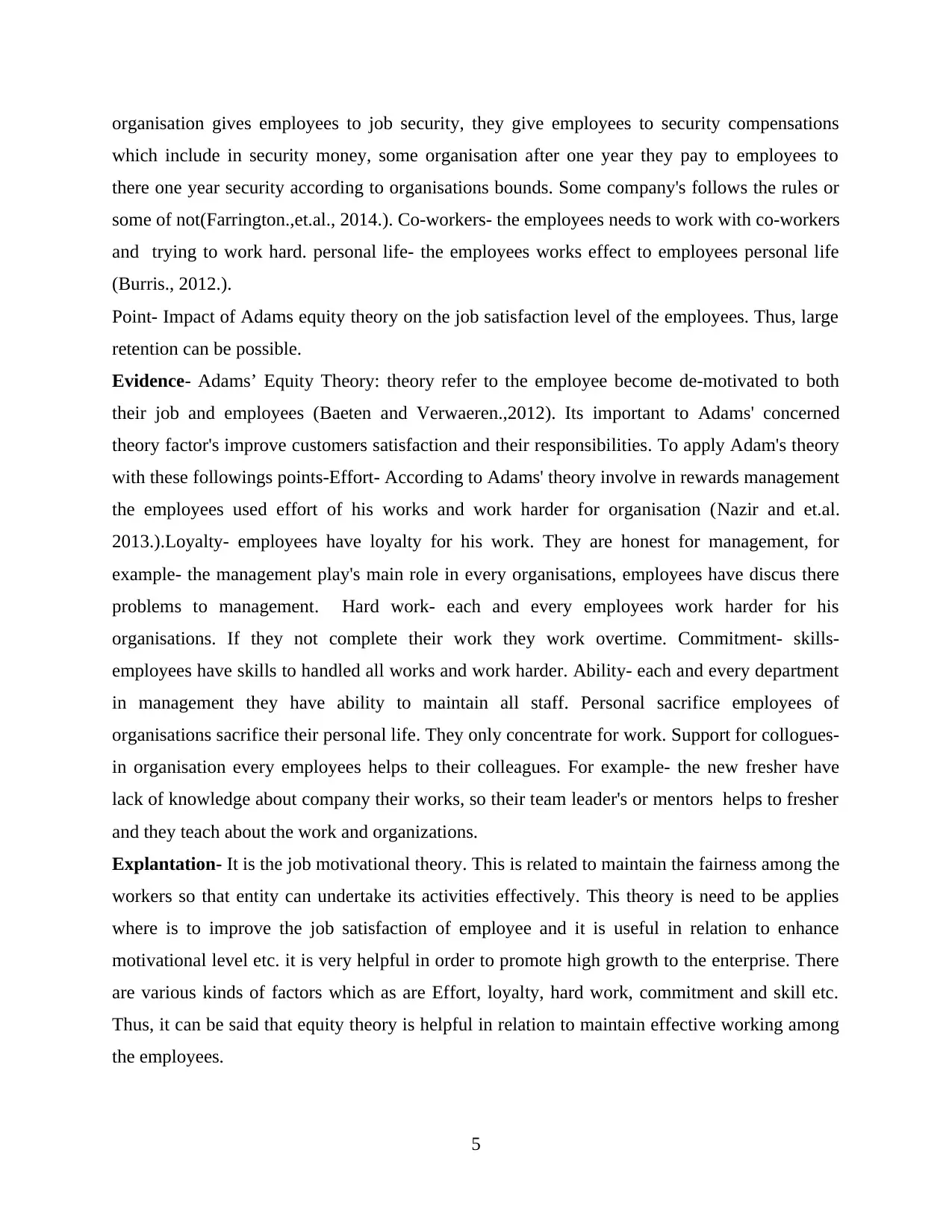
organisation gives employees to job security, they give employees to security compensations
which include in security money, some organisation after one year they pay to employees to
there one year security according to organisations bounds. Some company's follows the rules or
some of not(Farrington.,et.al., 2014.). Co-workers- the employees needs to work with co-workers
and trying to work hard. personal life- the employees works effect to employees personal life
(Burris., 2012.).
Point- Impact of Adams equity theory on the job satisfaction level of the employees. Thus, large
retention can be possible.
Evidence- Adams’ Equity Theory: theory refer to the employee become de-motivated to both
their job and employees (Baeten and Verwaeren.,2012). Its important to Adams' concerned
theory factor's improve customers satisfaction and their responsibilities. To apply Adam's theory
with these followings points-Effort- According to Adams' theory involve in rewards management
the employees used effort of his works and work harder for organisation (Nazir and et.al.
2013.).Loyalty- employees have loyalty for his work. They are honest for management, for
example- the management play's main role in every organisations, employees have discus there
problems to management. Hard work- each and every employees work harder for his
organisations. If they not complete their work they work overtime. Commitment- skills-
employees have skills to handled all works and work harder. Ability- each and every department
in management they have ability to maintain all staff. Personal sacrifice employees of
organisations sacrifice their personal life. They only concentrate for work. Support for collogues-
in organisation every employees helps to their colleagues. For example- the new fresher have
lack of knowledge about company their works, so their team leader's or mentors helps to fresher
and they teach about the work and organizations.
Explantation- It is the job motivational theory. This is related to maintain the fairness among the
workers so that entity can undertake its activities effectively. This theory is need to be applies
where is to improve the job satisfaction of employee and it is useful in relation to enhance
motivational level etc. it is very helpful in order to promote high growth to the enterprise. There
are various kinds of factors which as are Effort, loyalty, hard work, commitment and skill etc.
Thus, it can be said that equity theory is helpful in relation to maintain effective working among
the employees.
5
which include in security money, some organisation after one year they pay to employees to
there one year security according to organisations bounds. Some company's follows the rules or
some of not(Farrington.,et.al., 2014.). Co-workers- the employees needs to work with co-workers
and trying to work hard. personal life- the employees works effect to employees personal life
(Burris., 2012.).
Point- Impact of Adams equity theory on the job satisfaction level of the employees. Thus, large
retention can be possible.
Evidence- Adams’ Equity Theory: theory refer to the employee become de-motivated to both
their job and employees (Baeten and Verwaeren.,2012). Its important to Adams' concerned
theory factor's improve customers satisfaction and their responsibilities. To apply Adam's theory
with these followings points-Effort- According to Adams' theory involve in rewards management
the employees used effort of his works and work harder for organisation (Nazir and et.al.
2013.).Loyalty- employees have loyalty for his work. They are honest for management, for
example- the management play's main role in every organisations, employees have discus there
problems to management. Hard work- each and every employees work harder for his
organisations. If they not complete their work they work overtime. Commitment- skills-
employees have skills to handled all works and work harder. Ability- each and every department
in management they have ability to maintain all staff. Personal sacrifice employees of
organisations sacrifice their personal life. They only concentrate for work. Support for collogues-
in organisation every employees helps to their colleagues. For example- the new fresher have
lack of knowledge about company their works, so their team leader's or mentors helps to fresher
and they teach about the work and organizations.
Explantation- It is the job motivational theory. This is related to maintain the fairness among the
workers so that entity can undertake its activities effectively. This theory is need to be applies
where is to improve the job satisfaction of employee and it is useful in relation to enhance
motivational level etc. it is very helpful in order to promote high growth to the enterprise. There
are various kinds of factors which as are Effort, loyalty, hard work, commitment and skill etc.
Thus, it can be said that equity theory is helpful in relation to maintain effective working among
the employees.
5
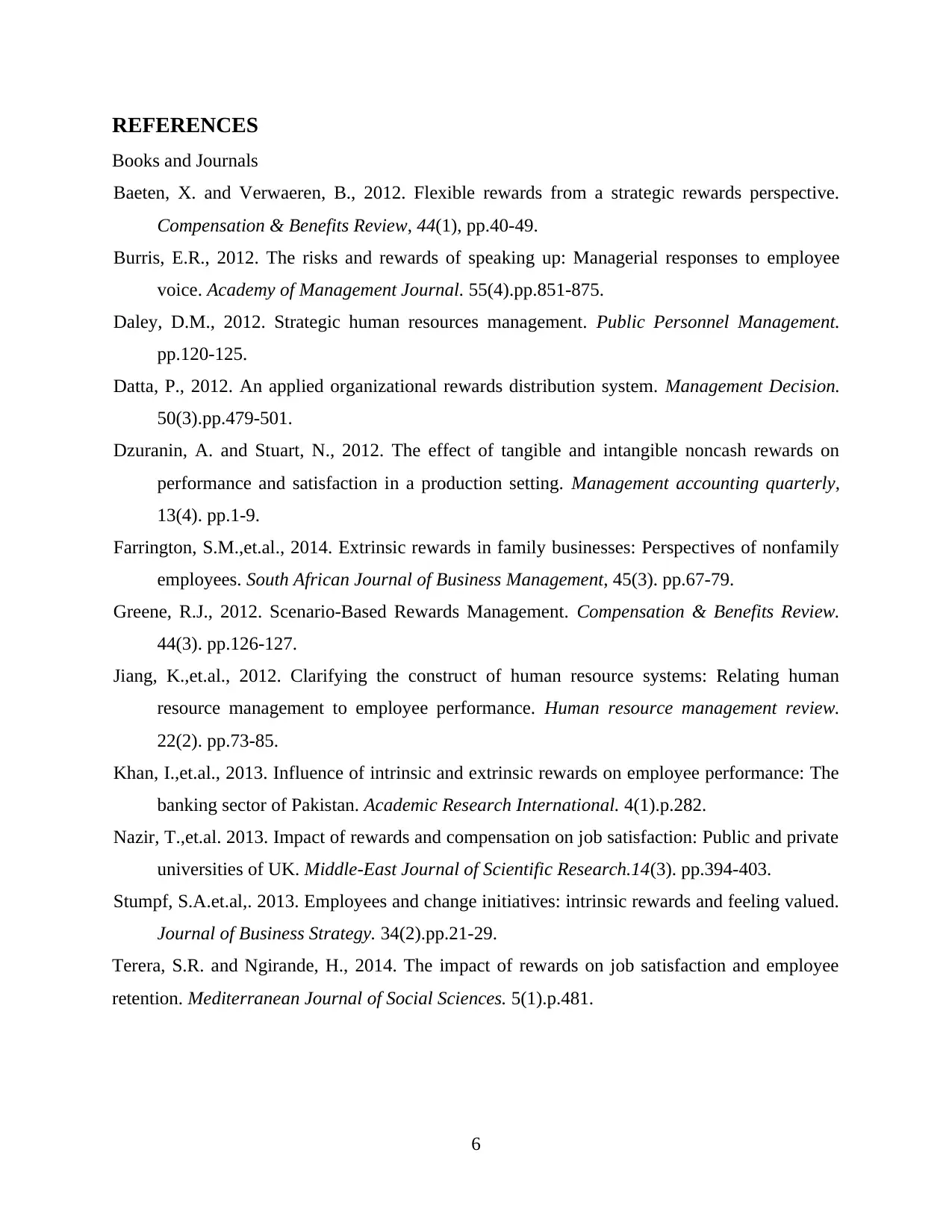
REFERENCES
Books and Journals
Baeten, X. and Verwaeren, B., 2012. Flexible rewards from a strategic rewards perspective.
Compensation & Benefits Review, 44(1), pp.40-49.
Burris, E.R., 2012. The risks and rewards of speaking up: Managerial responses to employee
voice. Academy of Management Journal. 55(4).pp.851-875.
Daley, D.M., 2012. Strategic human resources management. Public Personnel Management.
pp.120-125.
Datta, P., 2012. An applied organizational rewards distribution system. Management Decision.
50(3).pp.479-501.
Dzuranin, A. and Stuart, N., 2012. The effect of tangible and intangible noncash rewards on
performance and satisfaction in a production setting. Management accounting quarterly,
13(4). pp.1-9.
Farrington, S.M.,et.al., 2014. Extrinsic rewards in family businesses: Perspectives of nonfamily
employees. South African Journal of Business Management, 45(3). pp.67-79.
Greene, R.J., 2012. Scenario-Based Rewards Management. Compensation & Benefits Review.
44(3). pp.126-127.
Jiang, K.,et.al., 2012. Clarifying the construct of human resource systems: Relating human
resource management to employee performance. Human resource management review.
22(2). pp.73-85.
Khan, I.,et.al., 2013. Influence of intrinsic and extrinsic rewards on employee performance: The
banking sector of Pakistan. Academic Research International. 4(1).p.282.
Nazir, T.,et.al. 2013. Impact of rewards and compensation on job satisfaction: Public and private
universities of UK. Middle-East Journal of Scientific Research.14(3). pp.394-403.
Stumpf, S.A.et.al,. 2013. Employees and change initiatives: intrinsic rewards and feeling valued.
Journal of Business Strategy. 34(2).pp.21-29.
Terera, S.R. and Ngirande, H., 2014. The impact of rewards on job satisfaction and employee
retention. Mediterranean Journal of Social Sciences. 5(1).p.481.
6
Books and Journals
Baeten, X. and Verwaeren, B., 2012. Flexible rewards from a strategic rewards perspective.
Compensation & Benefits Review, 44(1), pp.40-49.
Burris, E.R., 2012. The risks and rewards of speaking up: Managerial responses to employee
voice. Academy of Management Journal. 55(4).pp.851-875.
Daley, D.M., 2012. Strategic human resources management. Public Personnel Management.
pp.120-125.
Datta, P., 2012. An applied organizational rewards distribution system. Management Decision.
50(3).pp.479-501.
Dzuranin, A. and Stuart, N., 2012. The effect of tangible and intangible noncash rewards on
performance and satisfaction in a production setting. Management accounting quarterly,
13(4). pp.1-9.
Farrington, S.M.,et.al., 2014. Extrinsic rewards in family businesses: Perspectives of nonfamily
employees. South African Journal of Business Management, 45(3). pp.67-79.
Greene, R.J., 2012. Scenario-Based Rewards Management. Compensation & Benefits Review.
44(3). pp.126-127.
Jiang, K.,et.al., 2012. Clarifying the construct of human resource systems: Relating human
resource management to employee performance. Human resource management review.
22(2). pp.73-85.
Khan, I.,et.al., 2013. Influence of intrinsic and extrinsic rewards on employee performance: The
banking sector of Pakistan. Academic Research International. 4(1).p.282.
Nazir, T.,et.al. 2013. Impact of rewards and compensation on job satisfaction: Public and private
universities of UK. Middle-East Journal of Scientific Research.14(3). pp.394-403.
Stumpf, S.A.et.al,. 2013. Employees and change initiatives: intrinsic rewards and feeling valued.
Journal of Business Strategy. 34(2).pp.21-29.
Terera, S.R. and Ngirande, H., 2014. The impact of rewards on job satisfaction and employee
retention. Mediterranean Journal of Social Sciences. 5(1).p.481.
6
⊘ This is a preview!⊘
Do you want full access?
Subscribe today to unlock all pages.

Trusted by 1+ million students worldwide
1 out of 9
Related Documents
Your All-in-One AI-Powered Toolkit for Academic Success.
+13062052269
info@desklib.com
Available 24*7 on WhatsApp / Email
![[object Object]](/_next/static/media/star-bottom.7253800d.svg)
Unlock your academic potential
Copyright © 2020–2026 A2Z Services. All Rights Reserved. Developed and managed by ZUCOL.




